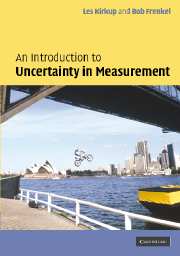 An Introduction to Uncertainty in Measurement
An Introduction to Uncertainty in Measurement Book contents
- Frontmatter
- Contents
- Dedication
- Preface
- 1 The importance of uncertainty in science and technology
- 2 Measurement fundamentals
- 3 Terms used in measurement
- 4 Introduction to uncertainty in measurement
- 5 Some statistical concepts
- 6 Systematic errors
- 7 Calculation of uncertainties
- 8 Probability density, the Gaussian distribution and central limit theorem
- 9 Sampling a Gaussian distribution
- 10 The t-distribution and Welch–Satterthwaite formula
- 11 Case studies in measurement uncertainty
- Appendix A Solutions to exercises
- Appendix B 95% Coverage factors, k as a function of the number of degrees of freedom, v
- Appendix C Further discussion following from the Welch–Satterthwaite formula
- References
- Index
5 - Some statistical concepts
Published online by Cambridge University Press: 06 July 2010
- Frontmatter
- Contents
- Dedication
- Preface
- 1 The importance of uncertainty in science and technology
- 2 Measurement fundamentals
- 3 Terms used in measurement
- 4 Introduction to uncertainty in measurement
- 5 Some statistical concepts
- 6 Systematic errors
- 7 Calculation of uncertainties
- 8 Probability density, the Gaussian distribution and central limit theorem
- 9 Sampling a Gaussian distribution
- 10 The t-distribution and Welch–Satterthwaite formula
- 11 Case studies in measurement uncertainty
- Appendix A Solutions to exercises
- Appendix B 95% Coverage factors, k as a function of the number of degrees of freedom, v
- Appendix C Further discussion following from the Welch–Satterthwaite formula
- References
- Index
Summary
Random errors arise from uncontrollable small changes in the measurand, instrumentation or environment. These changes are evident as variations in the values obtained when we carry out repeat measurements. In this chapter we shall consider methods of quantifying these variations: that is, describing them numerically using statistical methods. Some basic statistical concepts will therefore be introduced and discussed.
Sampling from a population
In statistics, the term population refers to the number of possible, but not necessarily actual, measured values. In some situations a population consists of an infinite number of values. In practice, we can measure only a sample drawn from a population, since time and resources are always limited. We hope and expect that the sample is representative of the population. In almost every case of measurement we sample a population, and the quantities of interest obtained from the sample (sometimes called sample statistics) should reliably represent corresponding parameters in the population (the population parameters). An example of such a quantity of interest, which quantifies the amount of scatter in values, is the standard deviation of the values.
There are cases where a sample may, in fact, be the entire population. Thus the examination results of a class of 30 students can be analysed statistically in order to determine, for example, the mean mark and the range of marks, with no attempt at generalising. The teacher of the class may be interested simply in that particular class.
- Type
- Chapter
- Information
- An Introduction to Uncertainty in MeasurementUsing the GUM (Guide to the Expression of Uncertainty in Measurement), pp. 53 - 82Publisher: Cambridge University PressPrint publication year: 2006
- 1
- Cited by


